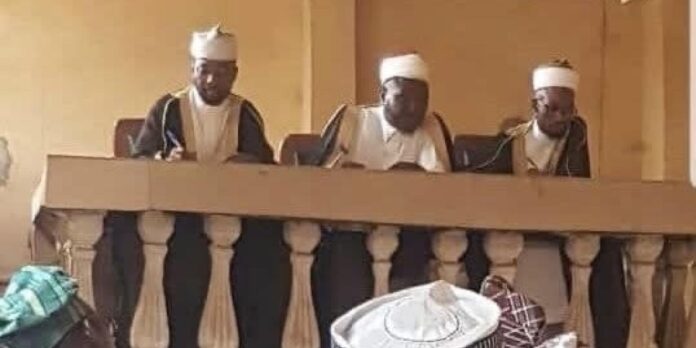In a move that has stirred both support and opposition, the Independent Shariah Arbitration Panel in Ekiti State held its first-ever public sitting last Thursday at the Oja Oba Central Mosque in Ado-Ekiti. This landmark event marks a significant moment in the ongoing conversation about the possible spread of Sharia law beyond Nigeria’s predominantly Muslim northern states, and into the southwestern region where the panel’s establishment has sparked mixed reactions.
The sitting, led by three esteemed Kadhis—Imam Abdullahi Abdul-Mutolib, Imam Abdulraheem Junaid-Bamigbola, and Dr. Ibrahim Aminullahi-Ogunrinde—was primarily focused on resolving two marriage-related disputes. The first case, a marital conflict between a husband and wife, was resolved amicably after a consent judgment was reached. Family members of the couple had reportedly intervened before the case came before the panel, facilitating a peaceful resolution.
“We are pleased to announce that after much discussion and input from family members, both parties have agreed to a settlement that allows them to move forward in peace,” said Imam Abdullahi Abdul-Mutolib, the head of the panel. “This is the essence of our work—to bring justice and harmony to disputes within our community.”
The resolution was seen as a positive step by many in Ekiti, particularly those who support the application of Sharia law in resolving family and civil disputes. However, the panel was not without its critics. The second case, involving allegations of marital neglect, was adjourned until January 30 for further investigation. The adjournment was requested by the panel in order to ensure a fair and thorough examination of the evidence.
“We cannot rush such important matters. We need more time to gather the facts and make an informed decision that serves the interests of justice,” explained Imam Abdulraheem Junaid-Bamigbola.
The establishment of the Shariah panel has not been without controversy, especially in a region where religious and cultural practices differ significantly from the northern parts of Nigeria. The southwest, home to a majority of Yoruba people, has historically been resistant to the imposition of Sharia law, given the region’s strong Christian population and diverse socio-political landscape.
One of the most vocal opponents of the move has been the United Kingdom (UK) and Europe branch of the Yoruba socio-cultural group, Afenifere. The group issued a stern warning against the introduction of Sharia law in the southwest, calling it a potential cause of disunity within the Yoruba community.
“We, the Yoruba people, are highly educated and enlightened. We will not allow ourselves to be divided by religious agendas that do not reflect our cultural values,” said a spokesperson for UK Afenifere. “The southwest is distinct from the north in terms of demographics, and we urge those pushing for Sharia law to desist from trying to impose a system that is not in line with the diverse, tolerant spirit of our region.”
The concerns raised by Afenifere and other critics point to a growing divide between those advocating for Sharia law’s implementation in the region and those who view it as an imposition of Northern Muslim culture that clashes with the largely Christian, progressive values of the Yoruba people. Many fear that the introduction of Sharia law could lead to unnecessary religious conflicts and tension in an already fragile national political environment.
Yet, the proponents of Sharia law, including the leaders of the Independent Shariah Arbitration Panel, argue that the panel’s purpose is not to impose religious law but to provide an alternative and culturally appropriate method of resolving disputes. This, they say, is particularly important in family matters, where traditional practices may not always be sufficient to address complex issues.
This first sitting of the Shariah panel has drawn attention to the ongoing debate over the expansion of Sharia law into other regions of Nigeria. While the north has long been governed by Sharia in matters of personal law, its application in the south remains contentious. Some critics argue that the panel’s establishment is the first step toward a wider implementation of Sharia in the southwest, a concern that has led to calls for greater public discourse on the matter.
In the wider context, this development is part of a broader religious and political debate that continues to unfold in Nigeria. The divide between the northern and southern regions on issues of governance, religion, and cultural identity is becoming more pronounced, and the issue of Sharia law is just one of many that highlights the challenges of maintaining national unity in such a diverse country.
As the panel prepares for its next sitting, it remains to be seen whether its work will be embraced by the broader community or whether it will become a point of contention in an already polarized national landscape.

